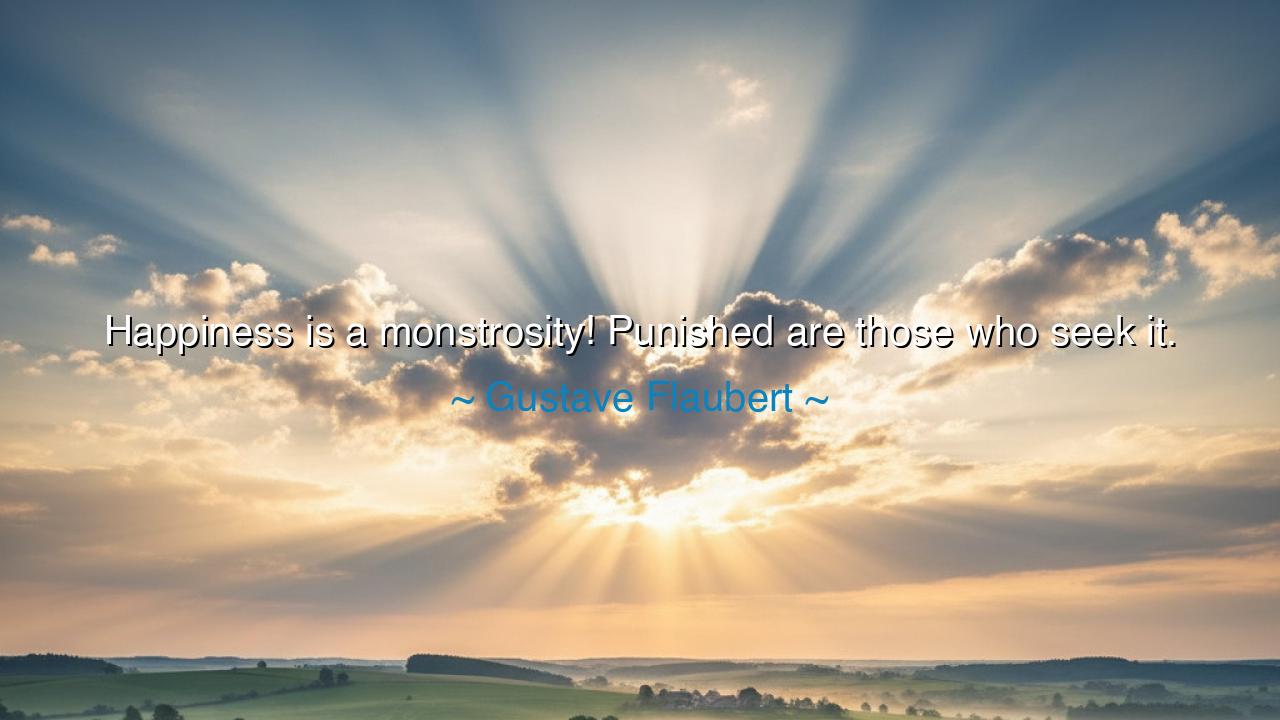
Happiness is a monstrosity! Punished are those who seek it.






In the words of Gustave Flaubert, “Happiness is a monstrosity! Punished are those who seek it.” These words strike like iron against stone — fierce, unsettling, and yet filled with the resonance of truth. They are not the cry of a cynic, but the wisdom of a man who saw too deeply into the illusions of life. Flaubert, the author of Madame Bovary, wrote from the furnace of disillusionment, where the dreams of happiness are melted down to reveal the harsh metals of reality. His declaration is not a rejection of joy itself, but a warning — that the endless pursuit of happiness often leads not to peace, but to torment. For when happiness is hunted like prey, it transforms into a monstrosity, devouring the very heart that seeks it.
The ancients knew this paradox well. The philosophers of Greece taught that happiness — what they called eudaimonia — is not a thing to be chased, but a state to be lived. Those who make happiness their goal turn it into an idol, and idols demand sacrifice. The more one grasps for it, the more it slips away. Flaubert, through the tragedies of his characters and the sorrows of his own existence, saw how men and women destroy themselves in pursuit of pleasure, success, or love, believing these will deliver them to happiness. Yet, like moths circling a flame, they are burned by the very light they desire. Thus, he calls happiness a monstrosity — not because it is evil, but because, when worshiped, it consumes its worshipers.
One need only look to the fate of Emma Bovary, Flaubert’s most famous creation. She was a woman who believed happiness lay just beyond her reach — in romance, in wealth, in beauty, in admiration. Each dream she touched dissolved into despair, and each disappointment drove her further into ruin. In her hunger for perfect joy, she destroyed the imperfect blessings she already possessed. Her story is the living embodiment of her creator’s warning: those who make happiness their idol will be punished — not by the gods, but by their own restless longing. For the heart that cannot be content with the present moment becomes its own executioner.
But Flaubert’s truth extends beyond fiction; it is written into the story of humanity itself. Consider the tale of King Midas, who begged the gods to grant him the golden touch, thinking it would bring him eternal happiness. His wish was granted — and soon his joy turned to horror, for even his food and his daughter became lifeless gold beneath his hands. What he had sought as a blessing became a curse, a monstrosity of his own making. So it is with all who demand that life yield constant joy: they mistake possession for peace, and in grasping too tightly, they crush the very thing they love.
Flaubert’s words remind us that happiness, when forced, becomes tyranny. To seek it without measure is to live in perpetual hunger, for the world does not bend to the will of desire. The wise, therefore, do not chase happiness as one chases a prize; they cultivate contentment, the quiet and enduring sister of joy. Happiness that is pursued flees, but happiness that is allowed to bloom — slowly, naturally, through gratitude, labor, and love — endures. The ancients compared it to a shadow: it follows those who walk steadfastly toward virtue, but disappears from those who turn to chase it.
The lesson, then, is this: do not make happiness your master. Let it be a guest, not a god. Seek meaning, not pleasure; seek purpose, not escape. In the pursuit of virtue, truth, and compassion, happiness will arise as a byproduct — not as a goal. The one who devotes themselves to creation, to learning, to service, finds that joy visits them uninvited, like sunlight falling through an open window. But the one who demands joy finds only darkness, for the soul that commands happiness forgets how to receive it.
So, let us live as the wise do — not in pursuit, but in presence. Do your work well. Love deeply, but without demand. Accept sorrow as part of the rhythm of life, and happiness will find you in its own time. Flaubert’s words, though forged in bitterness, reveal the path to peace: when you cease to chase happiness, it ceases to torment you. For in the quiet acceptance of life as it is — imperfect, fleeting, and yet profoundly beautiful — the monstrous becomes human again, and happiness returns, no longer as a punishment, but as a gift.






AAdministratorAdministrator
Welcome, honored guests. Please leave a comment, we will respond soon